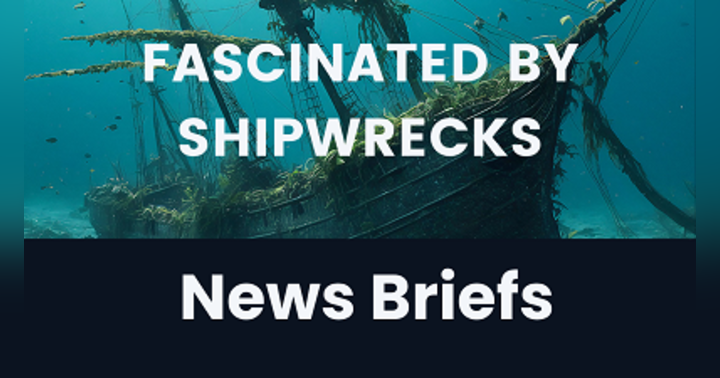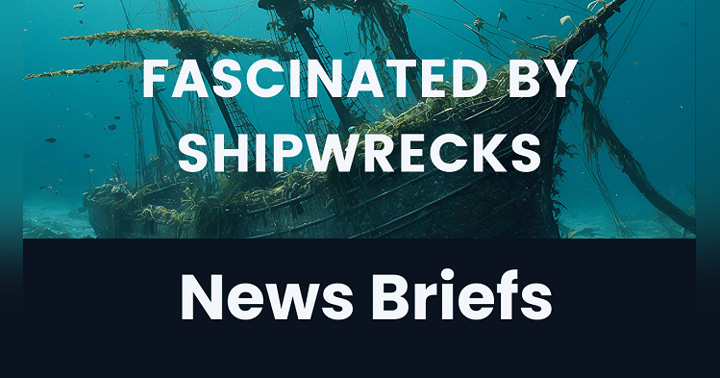The Le Lyonnais and Adriatic Disaster

Colorized Illustrated Times of London drawing Le Lyonnais sinking, December 27, 1856 (from Jennifer Sellitti's collection)
When Jennifer Sellitti first dipped her toe into the world of shipwreck hunting, she had no idea it would change the course of her life or lead to a decade-long search across the unforgiving waters of the North Atlantic. An attorney by day, she soon found herself training to dive and become a Coast Guard captain.
In a recent Fascinated by Shipwrecks episode, Sellitti shared her gripping journey of discovering the wreck of the Le Lyonnais, a French passenger steamship that sank in 1856, after colliding with the American sailing vessel Adriatic. The story, which she chronicles in her book is as much about obsession, loss, and persistence as it is about maritime history.
A Passion Sparked by Storytelling
Sellitti’s interest in shipwrecks didn’t begin with sonar or scuba gear, it started with a story. When she met her partner Joe Mazraani, a fellow attorney and avid shipwreck diver, she was captivated, not by the technical aspects of diving, but by the human drama behind every wreck.
"I remember sitting through a presentation about U-boats that was just slide after slide of specs," she laughed. "I wanted to know about the people on board. What were they feeling? What were their lives like?"
That desire to explore the human side of maritime disasters soon transformed her from landlocked lawyer to researcher, diver, and eventually, ship captain.
The Wreck That Wouldn't Let Go
The team suiting up for a dive. (left to right) Tim Whitehead, Tom Packer, Eric Takakjian, Jennifer Sellitti, Joe Mazraani, Andrew Donn. August 22, 2024
Courtesy Atlantic Wreck Salvage
It was in 2015 that Sellitti first asked Joe to name a shipwreck the team hadn’t yet found. Almost offhandedly, he said, “Le Lyonnais.” She went home that weekend and began researching.
"I came back with material none of them had ever seen," she said.
That research sparked a multi-year journey to locate the doomed vessel. Of the 132 people aboard Le Lyonnais, only 18 survived. The rest were left to perish in the icy Atlantic after the Adriatic’s captain, Jonathan Durham, left the scene without offering help, a move that led to an international trial and political uproar.
Determined to uncover the full story, Jennifer dug into archives and legal documents and split her research into two piles: one with data to help locate the wreck, and one with compelling human stories.
Law, Loss, and Legacy
As an attorney, Jennifer brings a unique lens to the historical events that followed the wreck.
Her book is structured in two parts: “Chapeau,” named for the heroic sailor who navigated the only lifeboat to safety, and “Durham,” which covers the trial and its broader implications. According to Jennifer, the incident sparked early conversations about international maritime law, lifeboat standards, and even no-fault insurance models.
"But the Civil War broke out just a few years later, and all of that conversation vanished," she noted. "I often wonder what might have changed had that momentum continued."
A Relentless Search and a Rewarding Discovery
Finding Le Lyonnais was no easy feat. The wreck turned out to be much farther out than initially believed, forcing Jennifer and Joe to refit their vessel entirely by installing a new engine and expanding fuel capacity just to reach the search zone. It took four dives over 48 suspenseful hours to confirm the identity of the wreck.
“Exploration,” Jennifer reflected, “isn’t always about the finding. It’s about the being there. About chasing something through time and water. That’s where the emotion lies.”
Preserving History
Joe Mazraani fanning away the sand to reveal a deadeye used as part of Le Lyonnais’ sail rigging. August 24, 2024. Photo courtesy of Andrew Donn
Artifact recovery is a controversial topic in maritime archaeology, and Jennifer doesn’t shy away from the debate. But in the harsh and shifting conditions of the North Atlantic, she believes recovery is essential for preservation.
“If we don’t recover these items, they’re often lost forever to storms, shifting sands, or fishing gear,” she said. “These wrecks are deteriorating, and if we can save even a few artifacts and share them with the public, it helps preserve a vital part of our collective history.”
Inspiring the Next Wave of Shipwreck Enthusiasts
Jennifer is passionate about involving citizen scientists and young people in maritime history. Through her program All Aboard, Jennifer gives virtual classroom visits and live talks, sharing not just the facts, but the passion behind the work.
"Ten years ago, I knew nothing about shipwrecks. Now I’ve helped discover one," she said. "I want people to know that you don’t need to be a marine archaeologist to be part of this. You just need curiosity and determination."
For more on this fascinating story, check out Sellitti's book:
The Adriatic Affair: A Maritime Hit-and-Run Off the Coast of Nantucket.
Want more fascinating stories from the deep?
Catch the full interview with Jennifer Sellitti on the Fascinated by Shipwrecks podcast.
Listen or watch anytime. You'll see more photos in the video version!
© 2025 Fascinated by Shipwrecks








